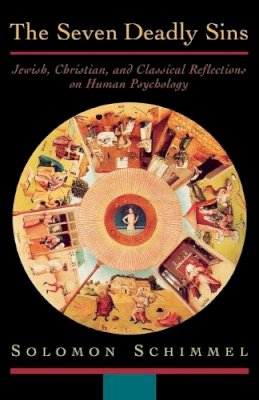
Stock image for illustration purposes only - book cover, edition or condition may vary.
The Seven Deadly Sins: Jewish, Christian, and Classical Reflections on Human Psychology
Solomon Schimmel
€ 25.84
FREE Delivery in Ireland
Description for The Seven Deadly Sins: Jewish, Christian, and Classical Reflections on Human Psychology
paperback. Draws on the psychological insights provided by the Hebrew Bible, the Gospels, Aristotle, Maimonides, Aquinas and others to show what we can learn from their teachings about the relationship between virtue and psychological well-being and vice and emotional distress. Num Pages: 320 pages, 11 pp halftones. BIC Classification: HPCF; HPQ; HRLB; JM. Category: (P) Professional & Vocational. Dimension: 216 x 141 x 19. Weight in Grams: 424.
All of us are engaged in a personal, ongoing battle with sin and vice. The seven deadly sins - lust, greed, envy, anger, pride, gluttony, and sloth - are our main antagonists in this struggle. They are primary causes of unhappiness and immorality, and because of their pervasive nature, have been of perennial interest to religious thinkers, philosophers, dramatists, and poets. In The Seven Deadly Sins, Solomon Schimmel explains why psychology must incorporate many of the ethical and spiritual values of religion and moral philosophy if it is to effectively address the emotional problems faced by modern men and women, be they believers or agnostics. Drawing on the psychological insights of the Bible, Aristotle, Maimonides, Aquinas, and Shakespeare, among others, he shows how all of us can learn from them about the relationship between virtue and psychological well-being and vice and emotional distress. This insightful and fascinating work guides us to master our passions rather than be enslaved by them so that we can become more humane and build a happier, caring society.
Product Details
Format
Paperback
Publication date
1997
Publisher
Oxford University Press United States
Number of pages
320
Condition
New
Number of Pages
320
Place of Publication
New York, United States
ISBN
9780195119459
SKU
V9780195119459
Shipping Time
Usually ships in 4 to 8 working days
Ref
99-2
About Solomon Schimmel
Solomon Schimmel is a professor of Jewish education and psychology at Hebrew College in Brookline, Massachusetts and a practicing psychotherapist.
Reviews for The Seven Deadly Sins: Jewish, Christian, and Classical Reflections on Human Psychology
"An ardent and eloquent argument for bringing back the biblical notion of sin and putting it to work in our own benighted world....Challenging, even radical. Essentially, Schimmel questions the conventional wisdom of...psychotherapy."
Los Angeles Times "Schimmel artfully weaves ideas from Judaism, classical philosophy, and Christianity to observe the ways the seven cardinal sins...are played out in the modern world....It is a scholarly rendering of ancient thought applied to modern times."
Contemporary Psychology "Schimmel's examples are penetrating and pointed....Read this book. It is time and effort well spent....[He] is literate, insightful, and has a wonderful narrative style."
Rocky Mountain News "This is a surprising, humane handbook for self-transformation."
Publishers Weekly "This book mediates the moral wisdom of antiquity in a very useful and engaging way. It shows that the temptations to which we are all subject do not change. What does change is our willingness to recognize and overcome them. Few of us can afford not to read this book."
Jon D. Levenson, Harvard University "A well-argued attack on value-free theories of psychoanalysis for general religion and psychology collections."
Library Journal "A useful study.... The book is welcome and valuable, especially for teachers."
Horizons
Los Angeles Times "Schimmel artfully weaves ideas from Judaism, classical philosophy, and Christianity to observe the ways the seven cardinal sins...are played out in the modern world....It is a scholarly rendering of ancient thought applied to modern times."
Contemporary Psychology "Schimmel's examples are penetrating and pointed....Read this book. It is time and effort well spent....[He] is literate, insightful, and has a wonderful narrative style."
Rocky Mountain News "This is a surprising, humane handbook for self-transformation."
Publishers Weekly "This book mediates the moral wisdom of antiquity in a very useful and engaging way. It shows that the temptations to which we are all subject do not change. What does change is our willingness to recognize and overcome them. Few of us can afford not to read this book."
Jon D. Levenson, Harvard University "A well-argued attack on value-free theories of psychoanalysis for general religion and psychology collections."
Library Journal "A useful study.... The book is welcome and valuable, especially for teachers."
Horizons
